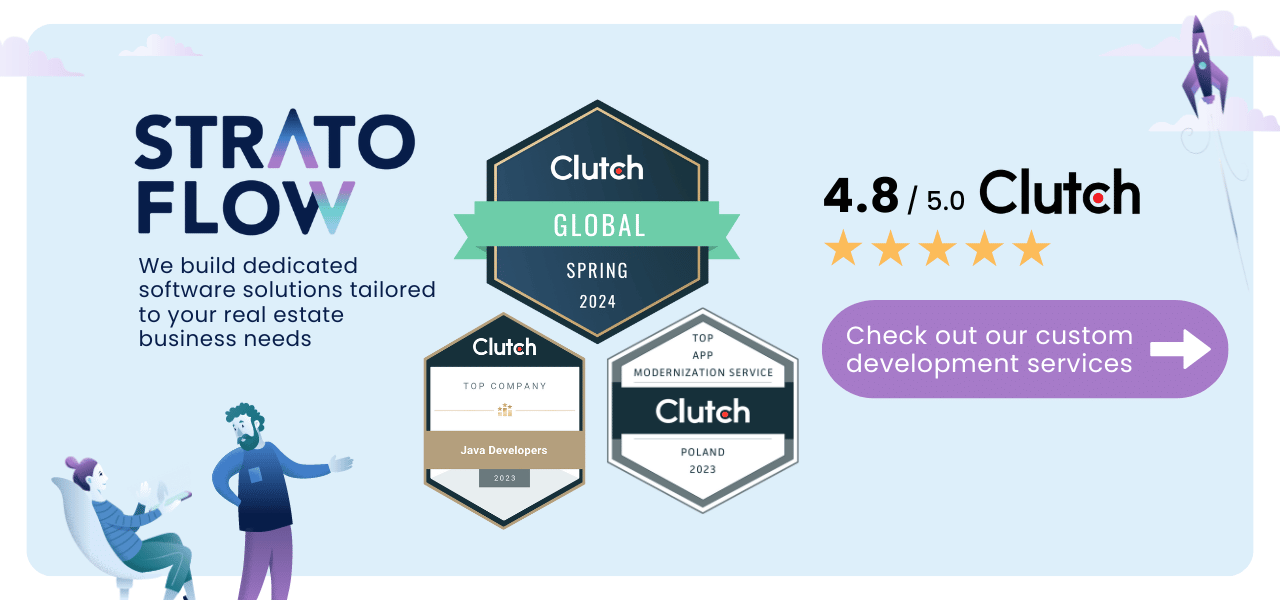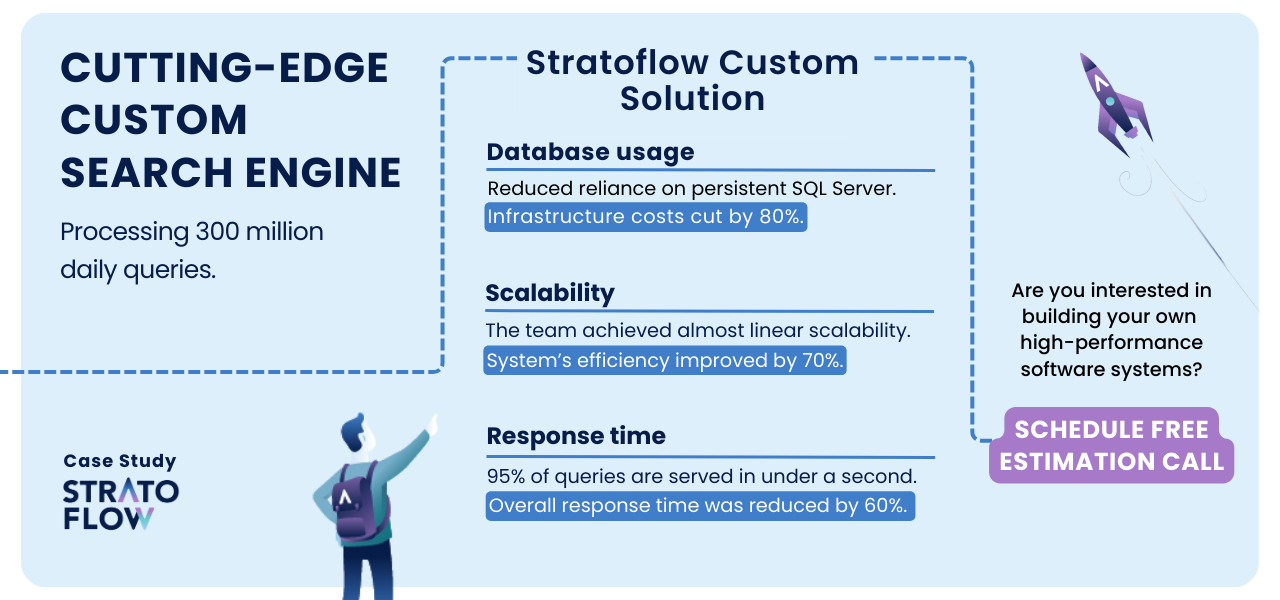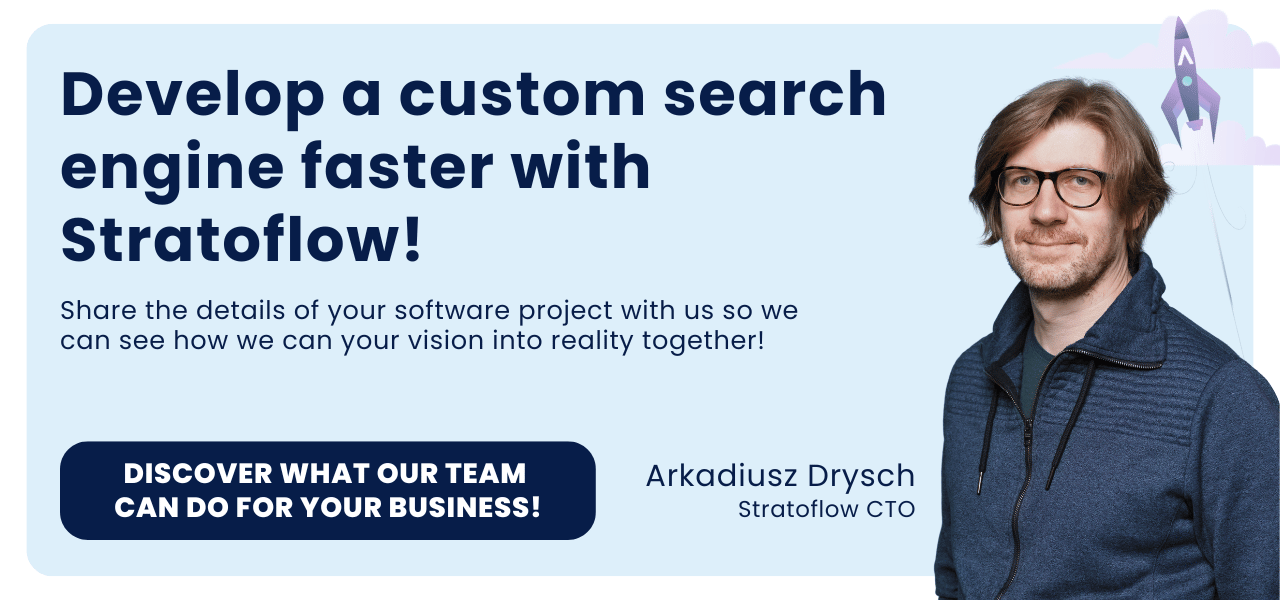
Hotel Metasearch Engines: Key Examples And Custom Solutions
When choosing a hotel, travelers often compare various features such as price, amenities, hotel room location and parking options, making it essential to have a tool that allows them to easily and efficiently evaluate offers from different providers.
Hotel metasearch engines are designed to meet these needs.
Let’s explore how these advanced search tools compare data from multiple sources and provide unique value to users, as well as discuss the technical challenges of building a custom solution from the ground up.
Contents
- What are Hotel Metasearch Engines?
- Creating Custom Hotel Metasearch Engine
- Five Key Travel Metasearch Engines in 2025
- What are Technical Challenges When Building a Custom Meta Search Engine?
- Strategies to Increase Efficiency of Hotel Metasearch Engines: Tips For Hoteliers and Metasearch Sites
- Hotel Metasearch Engines Statistics and Insights
What are Hotel Metasearch Engines?
Hotel metasearch engines are online platforms that aggregate and compare hotel rates and availability from multiple booking sites.
These systems streamline the accommodation search process by providing a centralized interface where users can view and compare rates from multiple sources.
Essentially, they act as intermediaries between travelers and various online travel agencies (OTAs) or hotel chains.
For example, when a user searches for a hotel in New York City on a metasearch engine such as Google Hotels or Trivago, the platform displays a list of available hotels along with their prices, which are sourced from multiple booking sites such as Booking.com, Expedia, or the hotel’s direct website.
This allows the user to see a comprehensive range of options and choose the best deal based on price, location, amenities, and other preferences.
Meta Search Engines vs. Custom Search Engine
Many people tend to confuse metasearch engines with regular custom search engines, but these two technologies serve different purposes and functions.
A metasearch engine, such as those used for hotel bookings, aggregates and compares data from multiple external sources to present users with a unified list of results. It’s focused on a specific type of information-in this case, hotel availability and rates-and presents a consolidated view of options from multiple booking platforms.
In contrast, a custom search engine is typically designed to search within a specific set of sites or a specific domain, and is focused solely on direct bookings.
It’s a tool that can be customized to search within pre-defined parameters and is often used by businesses or individuals to filter and prioritize search results based on specific criteria.
The key difference lies in their scope and function: metasearch engines pull data from multiple external sources to provide comparisons, while custom search engines focus on searching within a controlled set of sources.
Build your own custom metasearch engine
Metasearch Cost Models
One might ask: if metasearch engines compare results from various sources, how do they generate revenue?
The answer lies in their cost models, which allow these platforms to earn money while providing valuable services to users.
Here is a brief rundown of the most popular metasearch cost models:
- Cost Per Click (CPC): In this model, hotels or online travel agencies (OTAs) pay the metasearch engine a fee each time a user clicks on their link. The fee is typically determined by auction-based bidding, where higher bids result in better visibility in search results.
- Cost Per Acquisition (CPA): Here, the metasearch engine earns a commission based on the actual bookings made through its platform. The commission is typically a percentage of the booking value and is only paid when a transaction is completed.
- Hybrid Models: Some metasearch engines use a combination of the above models, allowing advertisers to choose the option that best suits their needs or blending multiple models to optimize revenue.
These cost models enable metasearch engines to maintain a sustainable business while offering users a free and comprehensive tool for comparing hotel options.
Creating Custom Hotel Metasearch Engine
Now that we understand the existing market landscape, we can better appreciate the value that potential customers seek from hotel metasearch engines.
Creating a custom hotel metasearch engine offers a unique opportunity to address specific needs and preferences within the travel industry and carve out a niche that can be highly successful.
The potential value of a custom hotel metasearch engine lies in its ability to tailor the user experience to a specific audience, offering features and functionality that general platforms may overlook.
By focusing on a particular niche – such as luxury travel, eco-friendly accommodations, or budget-conscious travelers – a custom hotel metasearch engine can deliver highly relevant results that resonate with its users, leading to increased user engagement and satisfaction for your organization.
But to design and build such an advanced system, and to make it scalable and perform under heavy load, you’ll need the expertise of seasoned professionals.
At Stratoflow, we have extensive experience in building custom search and metasearch engines tailored to the travel industry.
One of such examples is building a highly scalable travel search engine for a major UK hotel booking aggregator.
This project presented us with significant challenges: the client’s existing infrastructure, based on a traditional SQL Server, struggled to keep up with the demand for real-time price and availability calculations, which was crucial for their competitive edge in the travel industry.
Our solution was to develop an innovative in-memory data grid system that could handle the massive scale of queries – over 300 million daily – with unprecedented efficiency.
By using this technology, we transformed their legacy search engine into a highly scalable platform capable of real-time data processing, which was vital for maintaining up-to-date pricing and availability information.
The impact of this custom travel search engine on the client’s operations was profound.
Not only did we enhance the system’s scalability by 50%, but we also managed to reduce the overall infrastructure costs by 80%.
This allowed the client to handle a significantly higher volume of traffic without compromising performance, directly contributing to increased revenue and a strengthened market position.
Are you looking for a similar solution for your business>
Get in touch with us today to explore how we can bring your vision to life!
Five Key Travel Metasearch Engines in 2025
By now, we understand what metasearch engines are and the benefits of custom solutions. Let’s take a look at the leading platforms in this space.
In 2025, these platforms will continue to be the top choice for comparing lodging options, each offering unique features and benefits.
Here are five standout hotel metasearch engines shaping the market today.
Google Hotel Ads

Google Hotel Ads is a powerful metasearch platform integrated within Google’s search engine.
It displays hotel options directly in search results, offering a seamless experience for users. With its vast reach and integration with other Google services like Google Maps, it has become one of the go-to metasearch websites for many travelers.
Pros:
- Extensive reach due to Google’s dominance in search.
- Seamless integration with Google Maps and other Google services.
- User-friendly interface with comprehensive filtering options.
Cons:
- Can be competitive and costly for advertisers.
- Limited to users within the Google ecosystem.
Key Features:
- Direct booking options via Google’s interface.
- Personalized recommendations based on user preferences and search history.
- Integration with Google’s advertising network for broader visibility.
Trivago

Trivago is a specialized hotel metasearch and booking engine that aggregates rates from a wide range of booking sites. Known for its extensive advertising campaigns, Trivago offers a straightforward interface that allows users to compare prices quickly and easily and redirect to hotel website.
Pros:
- Wide selection of hotels from numerous booking sites.
- Simple, easy-to-use interface with key information like room availability and room prices.
- Comprehensive pricing comparison.
Cons:
- Can be overwhelming with the sheer number of options.
- Limited focus on user reviews and additional trip planning features.
Key Features:
- Price comparison from over 400 booking sites.
- Detailed hotel descriptions and photos.
- Price alerts to notify users of rate changes.
TripAdvisor

TripAdvisor started as a review platform but has evolved into a comprehensive travel metasearch engine.
It allows users to compare hotel prices while reading reviews and ratings from other travelers, making it a popular choice for those who prioritize user feedback in their decision-making process.
Pros:
- Extensive database of user reviews and ratings.
- Combines price comparison with detailed traveler insights.
- Additional travel planning tools and features.
Cons:
- User interface can be cluttered with ads and promotional content.
- Mixed user reviews can make decision-making more complex.
Key Features:
- Integration of hotel price comparison with millions of user reviews.
- Travel forums and guides for additional trip planning support.
- “Best Value” filter that balances price, rating, and location.
Kayak

Kayak is a comprehensive metasearch site
that covers hotels, flights, car rentals, and more.
It offers a robust set of tools for price comparison and trip planning, making it a versatile choice for travelers looking to book multiple aspects of their trip in one place.
Pros:
- Versatile platform that covers various travel needs.
- Advanced filtering options and price tracking features.
- User-friendly mobile app with real-time updates.
Cons:
- Some features may be overwhelming for users seeking a simple search.
- Limited customer support compared to direct booking sites.
Key Features:
- “Explore” feature that suggests destinations based on budget.
- Price tracking and fare prediction tools.
- Integration with various booking platforms for flights, hotels, and car rentals.
SkyScanner

Originally known for flight comparisons, Skyscanner has expanded to include hotels and car rentals.
Its clean and intuitive interface, combined with strong price comparison tools, makes it a popular choice for travelers seeking simplicity and efficiency.
Pros:
- Clean, user-friendly interface.
- Comprehensive search engine that includes hotels, flights, and car rentals.
- Strong international presence and multilingual support.
Cons:
- Limited direct booking options; often redirects to third-party sites.
- Fewer hotel options compared to specialized hotel metasearch engines.
Key Features:
- Multi-city search option for complex itineraries.
- Price alerts and flexible date search for finding the best deals.
- Integration with travel guides and tips for popular destinations.
[Read also: What Is a Booking Engine? Your Practical Guide]
Why Metasearch Engines are so Crucial For the Travel Industry?
Metasearch engines play a critical role in the travel industry, offering unique benefits that drive user engagement and business success.
By aggregating data from multiple booking platforms, they provide travelers with a comprehensive view of available options, increasing transparency and choice.
Key benefits of metasearch engines for the travel industry include:
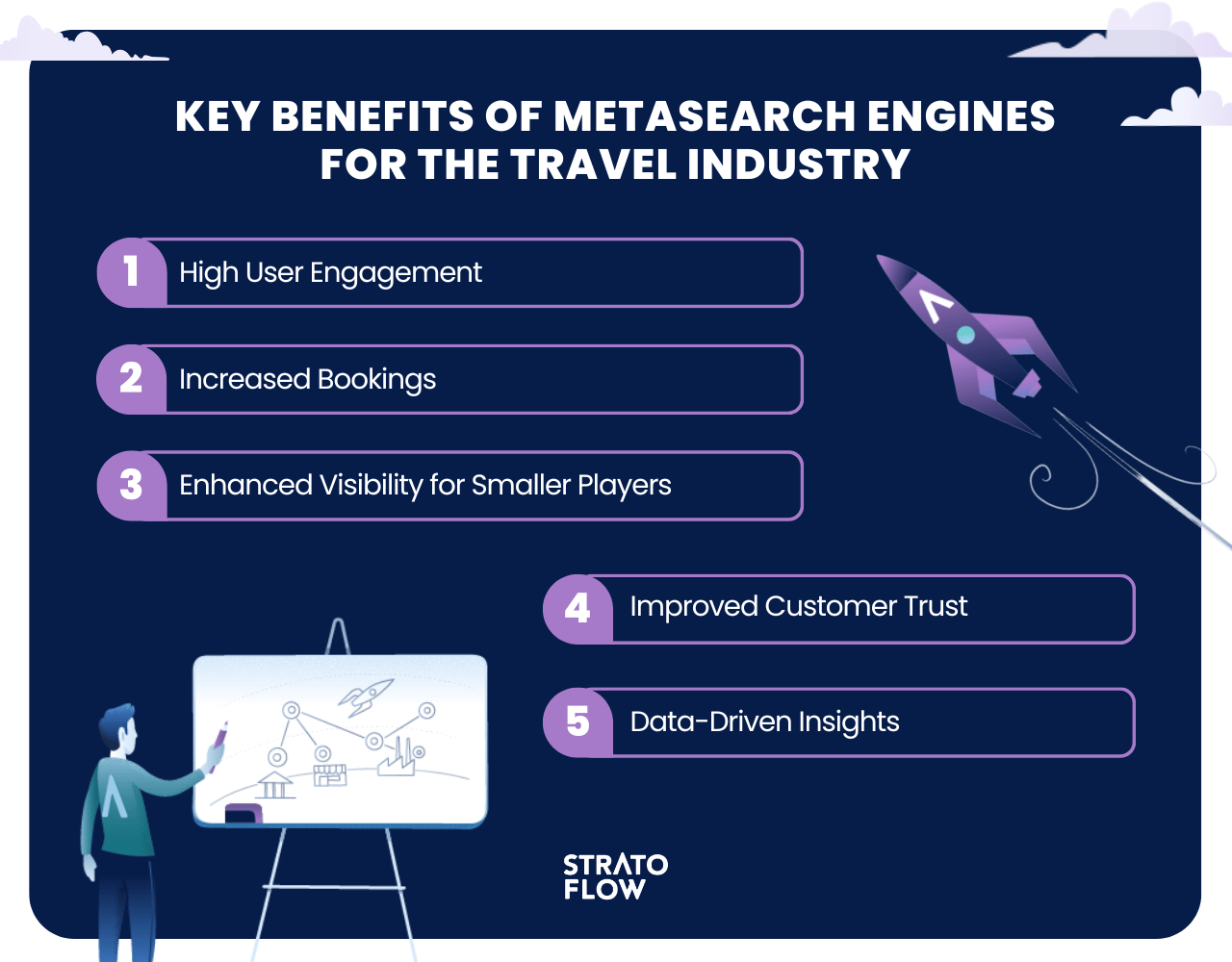
- High User Engagement: Over 100 million monthly users rely on metasearch engines like Kayak, Trivago, and Skyscanner, showcasing their popularity and trustworthiness.
- Increased Bookings: By simplifying price comparison, metasearch engines significantly boost booking rates for hotels and travel services. They streamline the decision-making process, making it easier for travelers to convert their searches into actual bookings.
- Enhanced Visibility for Smaller Players: These platforms help smaller travel providers compete by listing them alongside major players, increasing their exposure to potential customers who might otherwise not discover them. This democratizes the marketplace, allowing niche offerings to reach a broader audience.
- Improved Customer Trust: The transparency offered by metasearch engines builds trust with consumers, as they can see real-time prices from multiple sources. This reduces the likelihood of price discrepancies and hidden fees, which are often pain points in online booking.
- Data-Driven Insights: Metasearch engines collect vast amounts of data on user preferences, behaviors, and market trends. Travel companies can leverage these insights to refine their offerings, optimize pricing strategies, and target marketing efforts more effectively.
These benefits make metasearch engines an indispensable tool in the travel industry, driving both customer satisfaction and business growth.
What are Technical Challenges When Building a Custom Meta Search Engine?
Launching a startup with built-in metasearch functionality can be an enticing idea, and many successful examples have emerged over the years.
However, developing and deploying a custom metasearch system is more challenging than it might seem.
Drawing from our experience working on projects for our clients, we’ve identified several key technical challenges that must be addressed to ensure the success of a metasearch engine. These challenges are common in complex projects, but with the right strategies, you can pretty effectively overcome them.
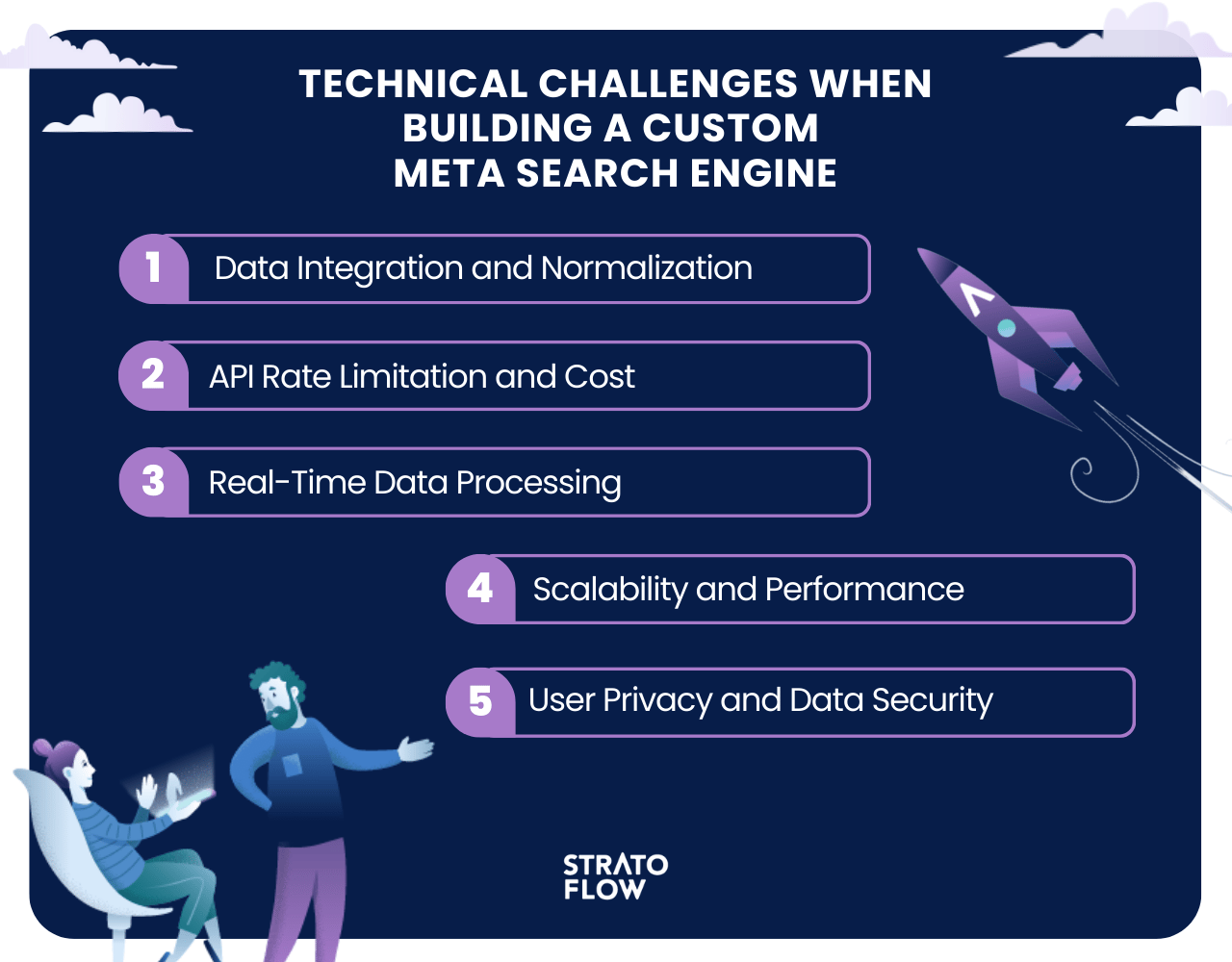
Data Integration and Normalization
Data from different sources often comes in various formats, structures, and with different levels of detail.
Integrating this data into a unified system can be complex, as inconsistencies in data can lead to inaccuracies and a poor user experience.
- Our Approach: We implement robust data parsing and transformation layers that convert disparate data formats into a standardized schema. This ensures that data from various sources is aggregated and presented consistently, maintaining the integrity and reliability of the information provided to users.
API Rate Limitation and Cost
Many data sources impose rate limits on API calls, restricting the number of requests that can be made within a certain timeframe.
Exceeding these limits can result in temporary blocks or additional costs, which can be challenging to manage as the platform scales.
- Our Approach: To address this, we cache frequently requested data to reduce the number of API calls needed. We also implement efficient query strategies that prioritize essential data requests and negotiate API usage contracts that align with your anticipated usage patterns, helping to control costs and maintain access.
Real-Time Data Processing
Providing real-time data from multiple sources is crucial for metasearch engines, especially in industries like travel where prices and availability can change rapidly. Processing and updating this information in real-time, while maintaining system performance, can be a significant technical hurdle.
- Our Approach: We use asynchronous processing and real-time data streaming technologies to manage the large volumes of data efficiently. These tools allow us to update the system continuously without overloading it, ensuring that users always have access to the most current information.
Scalability and Performance
As the user base grows, the system must be able to handle an increasing number of queries and data transactions without compromising performance. Poor scalability can lead to slow response times and potential system failures, negatively affecting user experience.
- Our Approach: We design our systems with scalability at the forefront, utilizing scalable cloud services, load balancers, and distributed databases. This architecture allows the system to expand capacity as demand increases, ensuring consistent performance even during peak usage times.
User Privacy and Data Security
Protecting user data and ensuring privacy is paramount, especially with growing concerns over data breaches and the need for compliance with regulations like GDPR.
Failure to secure data properly can lead to legal penalties and a loss of user trust.
- Our Approach: We implement strong security protocols, including data encryption and anonymization techniques. Regular audits and compliance with data privacy regulations are also integral to our approach, ensuring that user data is handled securely and responsibly.
[Read also: How To Build Travel Meta Search Engine: A Step-By-Step Guide]
Strategies to Increase Efficiency of Hotel Metasearch Engines: Tips For Hoteliers and Metasearch Sites
As we conclude, let’s tackle some best practices for optimizing hotel metasearch engines.
Whether you are running a metasearch platform or posting accommodation options, these strategies will help enhance your efficiency and visibility.
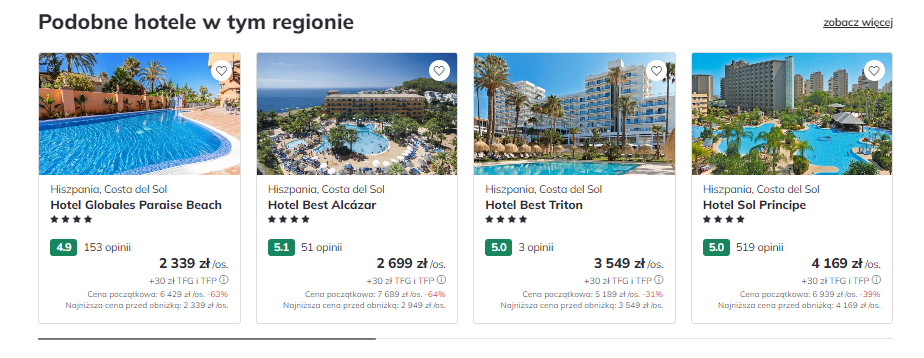
For companies running metasearch engines, ensuring low latency is paramount, as users expect fast and seamless results.
Achieving this requires a high-performance software architecture and a scalable database setup that can handle large volumes of data without slowing down. In addition, a smart and well-designed user interface is essential.
The interface should be intuitive, allowing users to easily navigate and compare key features of hotels and accommodations.
This not only improves user satisfaction, but also increases conversion rates.
For hoteliers, optimizing visibility on metasearch engines is critical to driving bookings.
Make sure your listings are complete and up-to-date, with high-quality images and detailed descriptions that highlight your unique selling points. Competitive pricing is also key, as metasearch engines emphasize price comparison.
Use rate management tools to adjust prices in real time and stay competitive.
Finally, manage reviews and feedback, as positive customer experiences can boost your rankings and attract potential guests.
Hotel Metasearch Engines Statistics and Insights
Travel and hotel metasearch engines have become kindispensable tools in the modern travel landscape, offering unparalleled convenience and value to users.
With over 70% of travelers accessing these platforms via mobile devices, the shift towards mobile-first browsing and booking has solidified their importance in the travel planning process.
Leading platforms like Google Flights, Kayak, and Skyscanner dominate the market, with Google Flights alone attracting millions of monthly active users, Kayak operating in over 60 countries and partnering with more than 700 airlines and travel providers, and Skyscanner serving over 100 million users each month.
This ease of comparison is crucial, as 87% of travelers use metasearch engines to compare prices before booking, demonstrating the significant role these platforms play in influencing consumer behavior.
Furthermore, advancements in technology, such as AI integration and voice search capabilities, have enhanced the personalization and efficiency of metasearch engines, catering to the evolving needs of tech-savvy consumers.
As travelers continue to prioritize transparency, convenience, and technological innovation, the value of travel and hotel metasearch engines is only expected to grow, making them an essential component of the travel industry.
Related Posts
Thank you for taking the time to read our blog post!
